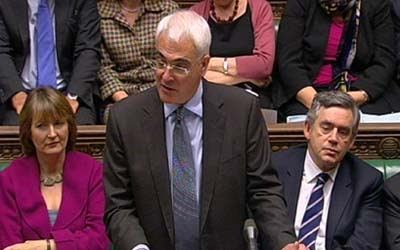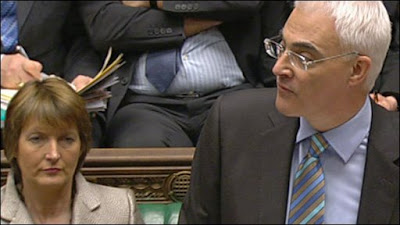 Ever wondered if search is important for video?
Ever wondered if search is important for video?.
 Ever wondered if search is important for video?
Ever wondered if search is important for video? Yesterday saw Mr Darling’s second Pre Budget Report since taking office last year. So, how does it compare with last years, and how will it affect us all?
Yesterday saw Mr Darling’s second Pre Budget Report since taking office last year. So, how does it compare with last years, and how will it affect us all? If you work at or from home, the part of the property used for work may be liable to business rates (also known as non-domestic rates) whilst the remainder of the property will continue to be liable to council tax (although an alteration may be made to its banding).
If you work at or from home, the part of the property used for work may be liable to business rates (also known as non-domestic rates) whilst the remainder of the property will continue to be liable to council tax (although an alteration may be made to its banding). HM Revenue & Customs (HMRC) has a special Helpline for anyone affected by the recent floods, where, they say, fast, practical help and advice is available.
HM Revenue & Customs (HMRC) has a special Helpline for anyone affected by the recent floods, where, they say, fast, practical help and advice is available. On 3 January this year, we blogged on the new HMRC advisory fuel rates. These are the rates used to calculate the VAT element of any vehicles mileage rates claimed, such as those under the Fixed Profits Car Scheme.
On 3 January this year, we blogged on the new HMRC advisory fuel rates. These are the rates used to calculate the VAT element of any vehicles mileage rates claimed, such as those under the Fixed Profits Car Scheme.  October has been a busy month for changes in legislation. One of these is the increase in holiday entitlement from 24 to 28 days (5.6 weeks) including bank holidays.
October has been a busy month for changes in legislation. One of these is the increase in holiday entitlement from 24 to 28 days (5.6 weeks) including bank holidays. The National Minimum Wage has increased, again, from the beginning of this month.
The National Minimum Wage has increased, again, from the beginning of this month. Almost all workers are entitled to NMW, but there are some groups who are not.
 From 1 October 2009, the Companies Act 2006 has introduced a set of new forms for conducting day to day company business.
From 1 October 2009, the Companies Act 2006 has introduced a set of new forms for conducting day to day company business. In a bid to move ever closer to the phasing out of paper filing, HMRC have announced new Government proposals as follows:
In a bid to move ever closer to the phasing out of paper filing, HMRC have announced new Government proposals as follows:Paper returns will still be an option for the remaining VAT registered businesses, but this will be reviewed More information can be found on the HMRC web site, at http://www.hmrc.gov.uk/vat/start/register/signup-online.htm
Changes To Banking Services And Making Payments To HMRC
During 2009, H M Revenue & Customs are moving over to new banking arrangements.
The banking details are as follows:
Current Bank Account Details:
Account Name: HMRC VAT
Sort Code: 10 00 00
Account Number: 52055000
New Bank Account Details:
Account Name: HMRC VAT
Sort Code: 08 32 00
Account Number: 11963155
If you use online banking, and have stored templates or transactions, that you use when making your current VAT payments, you may need to update these to reflect the changes.
More information or guidance can be found at http://hmrc.gov.uk/payinghmrc/
 On 2 April 2009, HMRC issued Brief 24/09 covering the new scale rates for day subsistence. (Day rates only, overnight allowances are unaffected).
On 2 April 2009, HMRC issued Brief 24/09 covering the new scale rates for day subsistence. (Day rates only, overnight allowances are unaffected). The Companies Act 2006 has made a number of changes, many of which will affect us, as small businesses, and some of which have already been actioned.
The Companies Act 2006 has made a number of changes, many of which will affect us, as small businesses, and some of which have already been actioned.You Do Not Need To:
What We Can Look Forward To:
Also remember; all Companies House accounts filing deadlines have been reduced, by one month to 9 months (private companies) and 6 months (public companies). This applies to all accounting periods beginning on, or after, 6 April 2008.
Failure to comply will result in a fine of up to £1,500.
From 1 October 2009, all original Companies House forms are being replaced. Watch this space for a future blog post on this particular change.
In the interim, you can check out the new provisions of the Act on the following link, including transitional provisions, and downloadable versions of the new forms.:
http://www.companieshouse.gov.uk/companiesAct/companiesAct.shtml
Companies House has produced guidance notes, in a variety of formats, giving step by step instructions on how to form a limited company.
 New research finds that staff with mobile technology such as Blackberries work an extra 15 hours a week as they constantly check emails even out of the office.
New research finds that staff with mobile technology such as Blackberries work an extra 15 hours a week as they constantly check emails even out of the office. As many of you may have heard, there is a new mobile phone directory being introduced shortly, called; '118 800'.
As many of you may have heard, there is a new mobile phone directory being introduced shortly, called; '118 800'. Your tax credits are awarded for a tax year. You are required to renew your claim after the end of each year so that your payments will continue. HMRC need to check whether they have paid you the right money during the year and whether they will carry on paying you the same amount of money going forward.
Your tax credits are awarded for a tax year. You are required to renew your claim after the end of each year so that your payments will continue. HMRC need to check whether they have paid you the right money during the year and whether they will carry on paying you the same amount of money going forward. Don't forget, tomorrow, 6 July is the deadline date for submission of 2009 Forms P11D and P11D(b) for all companies who pay qualifying benefits in kind to their directors and higher paid employees (including, of course, MPs. Wouldn't we all like to see one or two of those?)
Don't forget, tomorrow, 6 July is the deadline date for submission of 2009 Forms P11D and P11D(b) for all companies who pay qualifying benefits in kind to their directors and higher paid employees (including, of course, MPs. Wouldn't we all like to see one or two of those?) For those of you just starting out in business, or thinking of doing so, there's a new online resource, set up by HMRC, via Business Link, to help you through a few of the basics, such as starting out in business, National Insurance, record keeping and employing other people.
For those of you just starting out in business, or thinking of doing so, there's a new online resource, set up by HMRC, via Business Link, to help you through a few of the basics, such as starting out in business, National Insurance, record keeping and employing other people. Always keen to help the small business person wherever I can, I have been involved with Enterprisenation.com for a litle over a year now, providing articles and features for the site as and when required, and answering questions in the Forums, as they arise.
Always keen to help the small business person wherever I can, I have been involved with Enterprisenation.com for a litle over a year now, providing articles and features for the site as and when required, and answering questions in the Forums, as they arise. What can I say? We've only just all surrendered our weapons in the latest knife amnesty, and now HMRC have re introduced the Tax Amnesty.
What can I say? We've only just all surrendered our weapons in the latest knife amnesty, and now HMRC have re introduced the Tax Amnesty. Today, 19 May 2009, as we all know, is the deadline day for submission of our P35 and P14 end of year returns to HMRC.
Today, 19 May 2009, as we all know, is the deadline day for submission of our P35 and P14 end of year returns to HMRC. At 1st Addition, we're happy to announce our involvement with the UK's first ever Home Enterprise Day, which will will be held on Friday, November 20th.
At 1st Addition, we're happy to announce our involvement with the UK's first ever Home Enterprise Day, which will will be held on Friday, November 20th. Consumers overwhelmed with debts are unlikely to be able to write of credit card debt due to unenforceability.
Consumers overwhelmed with debts are unlikely to be able to write of credit card debt due to unenforceability. The Companies Act 2006 has brought about many changes in recent months. One of these is the reduction of filing dates for accounts from 10 months to 9 months for private companies and from 7 months to 6 months for plcs.
The Companies Act 2006 has brought about many changes in recent months. One of these is the reduction of filing dates for accounts from 10 months to 9 months for private companies and from 7 months to 6 months for plcs. Another highly anticipated Budget comes and goes, so what are the key points in this one?
Another highly anticipated Budget comes and goes, so what are the key points in this one? So that's all the numbers out of the way. How does this affect most of us?
The following changes have been announced which will come into effect from April 2010:
Pensions and Savings
The Budget announced the following changes to pensions:
An increase of £100 to over-80s households and £50 to over-60s households in 2009/10, alongside their Winter Fuel Payment.
Tax relief on pensions contributions will be reduced for those earning £150,000 and over
The overall annual investment limit for ISAs rises to £10,200 of which £5,100 can be saved in cash.
These higher limits will be available to over-50s from 6 October 2009 and to everyone from 6 April 2010.
Housing and Homeowners
The Stamp Duty land tax threshold on residential properties costing £175,000 or less will be extended until 31 December 2009.
As a result of this 'holiday', some 60% of UK homes are currently exempt from Stamp Duty.
Local Housing Allowance (LHA) is being reformed - households will no longer be able to keep any surplus LHA if it is higher than their rent.
Budget 2009 announced a £600 million fund to kick-start housebuilding, with the aim of delivering an additional 10,000 homes in England over the next two years.
This package includes £100 million for local authorities to build new social housing at higher energy efficient standards. The current economic climate continues to have a significant impact on housing supply. Additional, short-term, spending during the downturn is planned to stimulate housing development as well as boost the capacity of the house building industry in the long-term.
Motoring and Transport
The Government has announced a temporary vehicle scrappage scheme - it offers consumers a £2,000 discount when buying a new vehicle to replace a vehicle more than 10 years old, provided they have owned the vehicle for at least a year.
Budget 2009 confirmed the fuel duty increase announced in the 2008 Pre-Budget report, and further increases from 2010 to 2013.
Alcohol and Tobacco
Alcohol duty rates increase from 23 April 2009. The duty will increase by 2 per cent, adding one penny to the price of a pint of beer, 13 pence to the price of a bottle of spirits and four pence to the price of a bottle of wine.
Duty on tobacco will increase by 2 per cent from 22 April 2009.
Employment and Training
The Budget announced that 18 to 24 year olds who have been unemployed for 12 months will be guaranteed a job, training or a work placement.
An extra 54,500 places will be created in the next academic year for 16 and 17 year olds who wish to take them up.
Other Changes
For a link to the full Budget report, click on the heading of this feature, or you can check out a pdf of it from the 1st Addition web site.
 The G20 countries are to make available an additional one trillion dollars through the International Monetary Fund to boost the world economy, Gordon Brown has said today.
The G20 countries are to make available an additional one trillion dollars through the International Monetary Fund to boost the world economy, Gordon Brown has said today. Feng shui? So what’s that all about then? Isn’t it just a load of foreign mumbo jumbo?
Feng shui? So what’s that all about then? Isn’t it just a load of foreign mumbo jumbo?Office Feng Shui In A Workplace Office
Here are few tips to keep the energy flowing in your office.
The feng shui elements that are easiest to blend into an office decor are pictures and photographs. Look out for pictures that represent the various aspects and display them in the appropriate areas. Very obvious feng shui symbols, though, might invite unwelcome questions from visitors or co workers.
Office Feng Shui In A Home Office
Use office feng shui, if you're working from home, to maintain a professional approach to your business.
So why not give it a try. You never know, you might just notice a difference.

This is a further improvement on the ratings achieved in the previous survey.
With Utility Warehouse, customers value taking the 'total package', not just their energy, but their phone and broadband too.
Once more, Which? spells it out: for service, value and all-round customer satisfaction, the Utility Warehouse is number one.
To find out more, and see how much you could save, why not give us a call, for free, on 0800 061 2441.